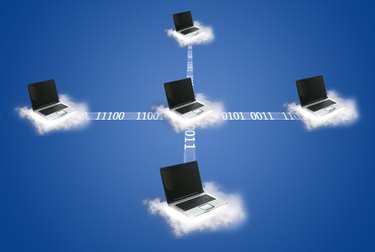
Whether it's a single-family home playing games and balancing checkbooks or a Fortune 500 company with millions of customers worldwide, computer networking adds power, functionality and flexibility to every computing environment. Once available exclusively in government and university settings, computer networking now extends from the office to the home and right into our pockets, with cell phones, Blackberries and music players.
File and Data Sharing
Video of the Day
At one time, file-sharing consisted mostly of saving documents to floppy disks that could be physically transferred to other computers by hand. With networking, however, files can be shared instantaneously across the network, whether with one user or with hundreds. Employees across departments can collaborate on documents, exchange background material, revise spreadsheets and make simultaneous additions and updates to a single central customer database without generating conflicting versions.
Video of the Day
Resource Sharing
Computer networking also allows the sharing of network resources, such as printers, dedicated servers, backup systems, input devices and Internet connections. By sharing resources, unique equipment like scanners, color printers or high-speed copiers can be made available to all network users simultaneously without being relocated, eliminating the need for expensive redundancies. What's more, specific shared resources can be targeted to deliver documents or results directly to the office or department that needs them.
Data Protection and Redundancy
Preventing critical data loss saves businesses worldwide countless millions of dollars every year. Networking computers together allows users to distribute copies of important information across multiple locations, ensuring essential information isn't lost with the failure of any one computer in the network. By utilizing central backup systems both on- and off-site, unique documents and data can be gathered automatically from every computer in the network and securely backed up in case of physical computer damage or accidental deletion.
Ease of Administration
Information technology (IT) officers and computer network administrators love network systems because they allow the IT professional to maintain uniform versions of software, protocols and security measures across hundreds or thousands of individual computers from one IT management station. Instead of individually upgrading each computer in a company one at a time, a network administrator can initiate an upgrade from a server and automatically duplicate the upgrade throughout the network simultaneously, allowing everyone in the company to maintain uniform software, resources and procedures.
Internal Communications
Computer networking also allows organizations to maintain complex internal communications systems. Network email can be instantaneously delivered to all users, voice mail systems can be hosted via network and made available systemwide and collaborative scheduling software and program management tools allow employees to coordinate meetings and work activities that maximize effectiveness, while also notifying managers and co-workers of plans and progress.
Distributing Computing Power
Organizations that demand extraordinary computing power benefit from computer networking by distributing computational tasks across multiple computers throughout the network, breaking complex problems into hundreds or thousands of smaller operations, which are then parceled out to individual computers. Each computer in the network performs its operations on its own portion of the larger problem and returns its results to the controller, which gathers the results and makes conclusions no computer could accomplish on its own.